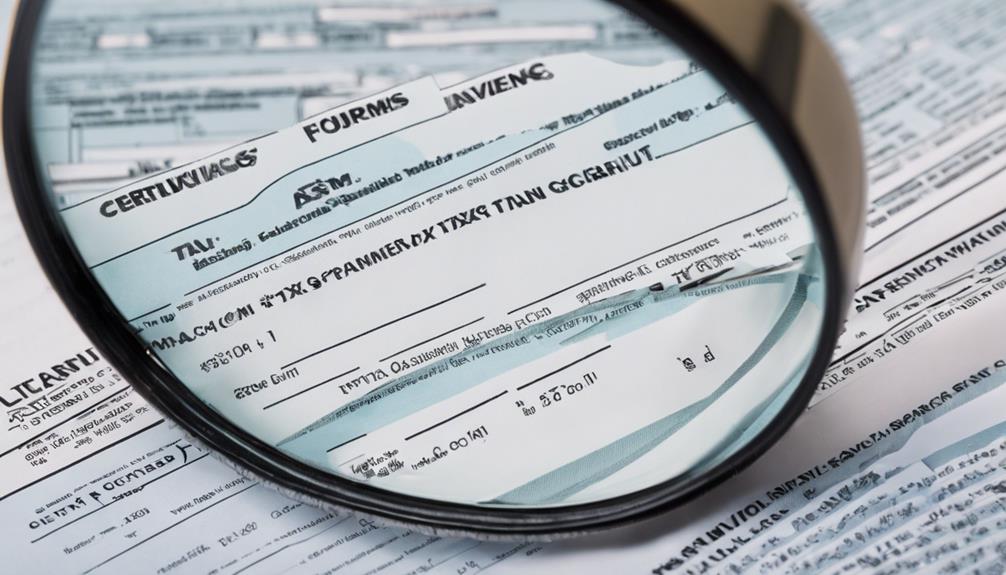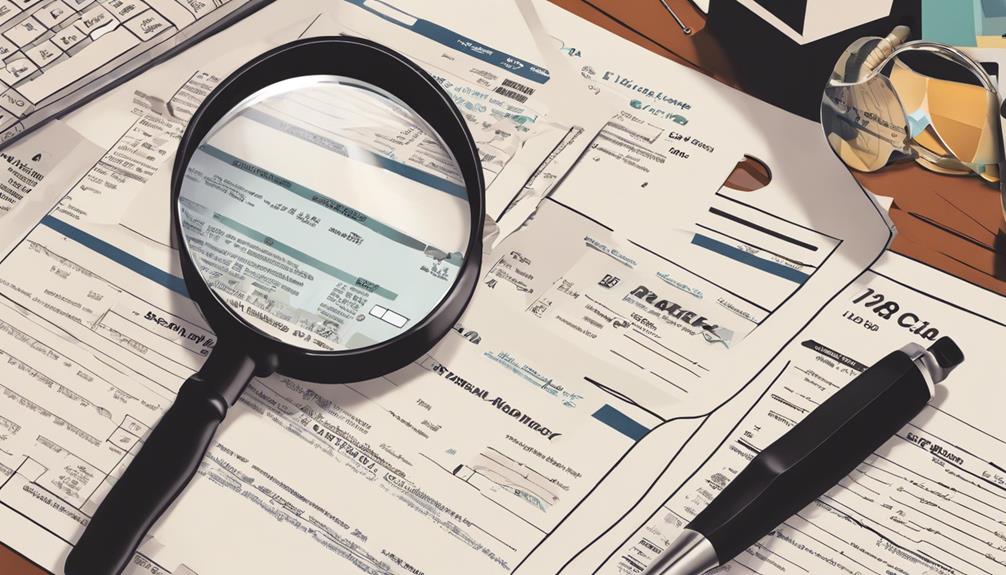Selecting the right tax preparer can make all the difference when it comes to maximizing your deductions and minimizing your tax liability. You'll want to look for a professional who not only has the necessary qualifications and industry experience, but also specializes in your unique tax situation. From certifications and ongoing training to client reviews and audit representation, there are several key factors to ponder. By taking the time to find the right tax preparer for your needs, you'll be well on your way to a stress-free filing process and the peace of mind that comes with it.
Key Takeaways
- Assess the tax preparer's qualifications, including professional certifications, industry experience, and specialized expertise in areas like individual, small business, or cryptocurrency taxes.
- Evaluate the tax preparer's availability, scheduling options, and responsiveness to inquiries to ensure a smooth and convenient tax preparation process.
- Review the tax preparer's fees and pricing structure, looking for transparency, fair rates, and value-added services that align with the complexity of your tax situation.
- Seek out positive client reviews, references, and recommendations to build confidence in the tax preparer's accuracy, ethics, and reliability.
- Ensure the tax preparer's location and accessibility are convenient for you, and that they prioritize ongoing education and training to stay current with tax laws and regulations.
Qualifications and Credentials

To become a tax preparer, you'll need to meet certain qualifications and obtain the necessary credentials. At a minimum, you'll need to have a thorough understanding of tax laws and regulations, as well as strong math and problem-solving skills. Many tax preparers also hold professional certifications, such as the Enrolled Agent (EA) or the Certified Public Accountant (CPA) designation.
Continuing professional development is essential in this field, as tax laws and regulations are constantly evolving. Look for a tax preparer who actively participates in industry training and workshops to stay up-to-date on the latest changes. Membership in industry associations, such as the National Association of Tax Professionals (NATP) or the American Institute of CPAs (AICPA), can also be a good indicator of a preparer's commitment to professional development and staying current with industry best practices.
Years of Experience
Alongside the necessary qualifications and credentials, the amount of years a tax preparer has been active in the field can be a significant factor in their expertise. When looking for a tax preparer, you'll want to find someone with specialized experience and industry expertise. The more years they've been preparing taxes, the more familiar they'll be with the latest tax laws, regulations, and common issues that taxpayers face.
Experienced tax preparers have likely seen it all, from simple returns to complex tax situations. They'll know how to navigate the intricacies of the tax code and identify valuable deductions and credits you may have missed. With their deep knowledge and honed skills, an experienced tax preparer can guarantee your return is accurate and maximize your tax savings.
Don't hesitate to ask prospective tax preparers about their years of experience. The more time they've spent in the industry, the more confident you can be in their ability to handle your taxes efficiently and effectively.
Tax Preparation Specialties

In addition to weighing a tax preparer's years of experience, it's important to determine their specific areas of expertise. Many tax preparers have niche expertise in certain tax preparation specialties, offering specialized services tailored to your unique needs.
Consider the following table of common tax preparation specialties:
| Specialty | Description |
|---|---|
| Individual Tax Returns | Preparing and filing personal income tax returns |
| Small Business Taxes | Handling the complex tax obligations of small companies |
| Cryptocurrency Taxes | Maneuvering the tax implications of digital assets |
| Estate and Trust Taxes | Expertly filing taxes for estates, trusts, and inheritances |
Depending on your tax situation, you'll want to find a preparer well-versed in your particular needs. Whether you're an individual, a small business owner, or dealing with cryptocurrency or estate planning, a tax preparer with the right specialized services can make all the difference in the accuracy and optimization of your return.
Availability and Scheduling
Your tax preparer's availability and scheduling preferences are essential factors to weigh when selecting the right professional for your needs. Look for tax preparers who offer online appointment booking, allowing you to conveniently schedule your session at your convenience. Customizable scheduling options, such as evening and weekend availability, can be particularly helpful if your workday makes it challenging to meet during standard business hours.
Additionally, consider the preparer's responsiveness to your inquiries. A reliable tax professional should be accessible, whether through prompt email replies or a dedicated customer service team. This level of responsiveness can make all the difference in ensuring your tax preparation process runs smoothly. Remember, your time is valuable, so choose a tax preparer who can accommodate your schedule and provide the attentive service you deserve.
Fees and Pricing Structure

When selecting a tax preparer, thoroughly understanding their fees and pricing structure is essential. Be sure to inquire about their payment options, which may include cash, check, credit card, or even payment plans. Some tax preparers also offer service guarantees, promising to cover any penalties or interest charges if they make a mistake on your return.
Compare the total cost of their services, including any additional fees for things like audit representation or advice on tax planning. Beware of preparers who quote suspiciously low prices, as they may be cutting corners or using unscrupulous tactics. Experienced, reputable tax professionals will charge fair, transparent rates that align with the complexity of your return.
Ultimately, you want to work with a tax preparer whose fees fit your budget and who provides high-quality service you can trust. Don't be afraid to ask questions and get a clear breakdown of all charges before moving forward.
Client Reviews and References
When hiring a tax preparer, their client reviews and references are vital. Look for high ratings, positive testimonials, and referrals from satisfied customers. These factors can give you confidence in the preparer's reputation and reliability.
Reputation and Reliability
A tax preparer's reputation and reliability are paramount in building trust with clients. You'll want to choose a tax professional with a proven track record of accuracy, ethical conduct, and exceptional customer service.
Begin by checking online reviews from past clients. Look for consistent praise for the tax preparer's industry expertise, attention to detail, and responsiveness to clients' needs. Avoid anyone with a pattern of complaints about missed deadlines, errors, or poor communication.
| Reputation Factors | Excellent | Average | Poor |
|---|---|---|---|
| Customer Service | Prompt, Courteous | Inconsistent | Rude, Unresponsive |
| Industry Expertise | Highly Knowledgeable | Competent | Lacks Expertise |
| Reliability | Consistently Accurate | Some Errors | Frequent Mistakes |
Additionally, ask the tax preparer for references from long-term clients. Reputable professionals will be happy to provide contact information for satisfied customers who can vouch for the quality of their work.
Ratings and Testimonials
Client reviews and references can provide valuable insights into a tax preparer's performance and customer service. When evaluating a tax preparer, don't overlook their ratings and testimonials. Look for consistent positive feedback on their communication style, customer service, and overall competence. Reputable tax preparers should have a track record of satisfied clients who appreciated their expertise, responsiveness, and ability to navigate the complexities of tax preparation.
Check the tax preparer's website, online reviews, and professional organizations for client testimonials. Pay attention to how the preparer addresses client concerns and whether they're willing to provide references. A tax preparer with a strong reputation and rave reviews is more likely to deliver a smooth and stress-free tax filing experience. By considering ratings and testimonials, you can gain confidence in your choice and safeguard you work with a tax preparer who aligns with your needs and expectations.
Referrals and Recommendations
Obtaining referrals and recommendations from previous clients can provide invaluable insights about a tax preparer's capabilities and track record. Reach out to your professional networks, such as local business associations or industry groups, to ask for recommendations. You can also tap into your personal connections, like friends, family, or colleagues, to see if they've worked with a tax preparer they'd recommend. Don't just rely on online reviews – speaking directly with a preparer's past clients can give you a more well-rounded understanding of their services. Ask about the preparer's communication, expertise, and overall performance. Inquire about any issues or challenges the client faced and how the preparer handled them. Positive referrals and recommendations can give you confidence that a tax preparer will provide the high-quality service you need, while negative feedback should raise red flags. Thoroughly vetting a tax preparer's references is a critical step in ensuring you find the right fit for your tax preparation needs.
Accessibility and Location

When choosing a tax preparer, consider their proximity to your residence. Can you easily access them by public transportation? Is on-site parking available? These accessibility factors can make a difference in your overall experience.
Proximity to Residence
Proximity to your residence can be an essential factor when selecting a tax preparer. Convenience and accessibility can make the process of filing taxes less stressful and more efficient. Consider these factors when evaluating tax preparers near you:
- Commute time: Choose a tax preparer within a reasonable distance from your home or workplace. This can save you time and reduce the hassle of traversing traffic or public transportation.
- Neighborhood convenience: Select a tax preparer that is located in a familiar or easily accessible area, such as near your bank, grocery store, or other frequently visited businesses.
- Parking availability: Look for a tax preparer with ample parking or easy access to public transportation, as this can make the experience more seamless.
- Business hours: Verify that the tax preparer's operating hours align with your schedule, allowing you to visit during times that are most convenient for you.
Public Transportation Access
Access to public transportation can be a crucial consideration when selecting a tax preparer. Convenient access to buses, trains, or subways can make it easier for you to get to your tax preparer's office, especially if you don't have your own vehicle. Look for tax preparers who are located near major public transit hubs or have multiple nearby transportation links. This can conserve you time and money on your commute, allowing you to focus on getting your taxes filed efficiently. Consider the specific public transit options available, such as bus routes, subway stations, or commuter rail lines. A tax preparer's location relative to these public transportation choices can greatly influence your overall experience. Prioritize accessibility when evaluating potential tax preparers to ensure your tax preparation process is as smooth and stress-free as possible.
On-Site Parking Availability
Another important consideration when choosing a tax preparer is the availability of on-site parking. Having convenient parking can make a significant difference in your overall experience, especially during the busy tax season. Look for a tax preparer who offers:
- Ample parking spaces to accommodate their clients.
- Handicap accessibility to ascertain easy access for those with mobility challenges.
- Well-lit and secure parking areas with on-site security measures for your peace of mind.
- Proximity to public transportation options, if applicable, for those who prefer not to drive.
The availability of on-site parking can save you time and hassle, allowing you to focus on the task at hand – getting your taxes filed accurately and efficiently. When evaluating potential tax preparers, be sure to ponder their parking situation as part of your decision-making process.
Continuing Education and Training
Maintaining your expertise as a tax preparer often requires ongoing education and training. The tax industry is constantly evolving, with changes in regulations, software, and best practices. To stay ahead of the curve, you'll need to engage in ongoing professional development. This could include attending industry conferences, taking online courses, or participating in webinars.
Continuing education not only keeps you up-to-date but also demonstrates your commitment to providing exceptional service to your clients. Many state and federal organizations require tax preparers to complete a certain number of continuing education hours each year. This guarantees that you're always knowledgeable about the latest tax laws and can offer your clients the most accurate and up-to-date advice.
Investing in your own education and training is a small price to pay for the peace of mind it brings to your clients. By staying informed and improving your skills, you'll be better equipped to handle even the most complex tax situations.
Tax Filing Processes

The tax filing process is a critical component of your role as a tax preparer. You'll need to guide your clients through the necessary steps to confirm accurate and timely tax submissions.
- Information Gathering: Collect all relevant financial documents from your clients, including W-2s, 1099s, and any other pertinent information.
- Tax Preparation Methods: Utilize reliable tax preparation software or manual calculations to determine the client's tax liability and eligible deductions.
- Electronic Filing: Leverage e-filing capabilities to streamline the tax filing process and guarantee prompt submission to the IRS.
- Client Communication: Maintain clear and consistent communication with your clients throughout the tax filing procedures, addressing any questions or concerns they may have.
Audit Representation and Support
As a tax preparer, you may encounter situations where your clients require audit representation and support. When their tax returns are selected for an audit, your expertise in tax audit negotiation strategies and tax audit resolution techniques can be invaluable. You'll need to thoroughly review the client's records, understand the IRS's concerns, and develop a strategic approach to address the audit. This may involve negotiating with the IRS, providing additional documentation, or even appealing the audit findings. Your ability to effectively communicate with the IRS on your client's behalf can drastically improve the outcome and minimize the stress and financial impact of the audit process. By staying up-to-date with the latest tax laws and audit procedures, you can ascertain your clients receive the best possible representation and support, ultimately protecting their financial interests.
